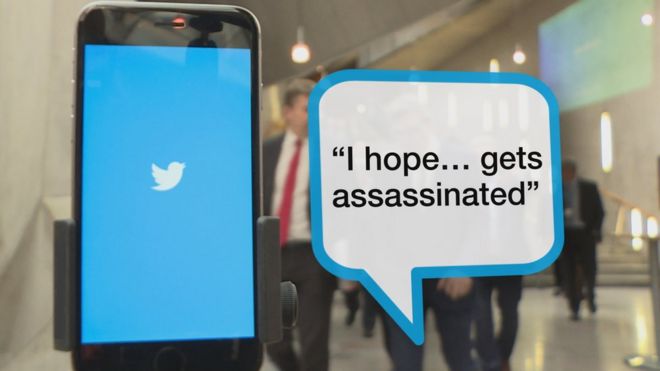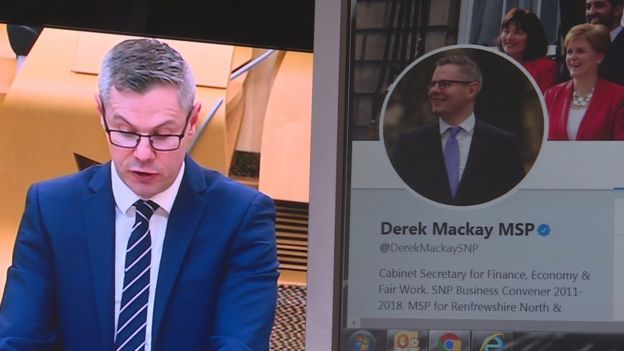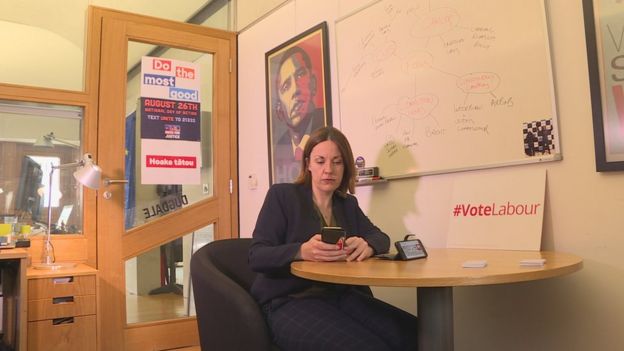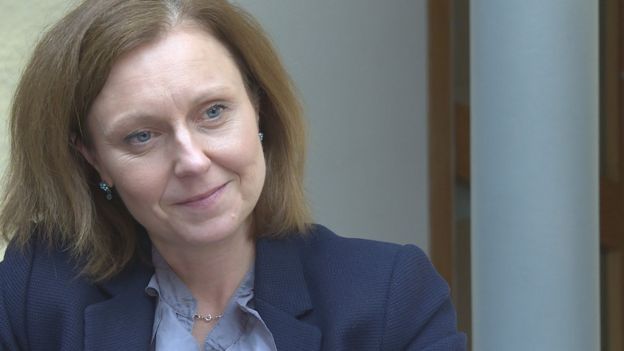
Senior MSPs have raised concerns that the increasingly “polarised” political debate on social media is spilling over into abusive behaviour in “real life”.
Three quarters of members have had security reviews at their local offices with community police officers.
Finance Secretary Derek Mackay said he had recently faced “aggressive” people swearing at him in the street.
And others have called for parties to sign up to a joint code of conduct to ensure future debate is “respectful”.
Twitter said it was working to “improve the health of the public conversation” and was acting to shut down abusive accounts.
- MSP fears for safety after online threats
- Female politicians speak out over Twitter abuse
- MP’s staff member threatened at constituency office
Almost every politician uses social media in some way, either to spread their political messages or to engage with constituents.
While all the politicians who spoke to BBC Scotland were quick to highlight the positives of social media, they also voiced fears about the “dark side” of the internet endangering people’s safety and putting others off getting involved in politics.
Mr Mackay said he was still “addicted” to staying connected to social media, but said the “hostile, aggressive, extreme” tone of debate online was starting to spill over into real life.
He said: “You’d like to think that the people engaging in that on Twitter would never say such things to your face if you met them in the street, but even that’s starting to change.
“Just recently when I was on a walkabout in my own constituency in the town centre, there were some – a minority, people that had never engaged with me before – who would just randomly swear at you or insult you as if that was somehow now normalised, acceptable, civil behaviour. Well it’s not.
“There used to be a view that many things said on social media would never be said to your face, but it is now – and it’s quite unpleasant, to the point of aggression.”

A number of politicians have voiced concerns about their safety in light of social media abuse. Tory MSP Annie Wells told the Mail on Sunday police had advised her to vary her route to work after receiving threats online.
The Scottish Parliament said a total of £40,000 has been spent on security modifications for MSPs offices in the last 12 months – such as metal shutters on shopfronts, intercoms, strengthened front doors and counters.
And a further £14,000 has been spent on lone worker safety devices over the last two years.
Former Scottish Labour leader Kezia Dugdale said threatening messages online and violent acts offline were connected.
She said: “I think there’s a compelling link between the prevalence of these threatening online tweets and then what you’ve seen in New Zealand, or on the streets of the UK with Jo Cox being murdered.
“Because what happens is, people go online, they say these things, they follow people who think like they do, they become more convinced of their own self-righteousness, they’re encouraged to take it to the next level.
“That might be turning up at an office and saying out loud the things you say on the internet, and before you know it it turns into the violent extremist actions we’ve seen in New Zealand and the UK and right across the world.”

Ms Dugdale has called in the police about online death threats on three occasions during her eight years as an MSP, and says she has developed “emotional body-armour” over the years.
However, she fears there is a “great danger” that online bullying could “put off a whole generation of young people” from participating in politics.
This echoed comments made by First Minister Nicola Sturgeon in 2018, when she said social media abuse makes her “angry” because “I worry it is putting the next generation of young women off politics”.
Ms Dugdale said: “The benefit of social media is that it should open up your politicians to you, to make them more accessible. But if you have a culture like this, which encourages people to say exactly what they think using whatever language they want, then you’re going to going to have politicians responding in a way where they become so thick skinned they lose the ability to feel, to be emotional, to have the kind of human response you’d expect them to.
“You have to put your guard up, to protect yourself from that, and years down the line I think we might regret forcing our politicians to lack so much emotion.”
Scottish Conservative MSP Rachael Hamilton – who has also had to report Twitter abuse to police – agreed that the tone of debate online was “putting candidates off standing” in elections.
She is calling for a “joint code of conduct” to be agreed before the next Scottish Parliament election in 2021, so parties can agree on the need for a “respectful dialogue”.

Ms Hamilton said her experience with Twitter had improved since she learned how to block out abuse – using techniques MSPs have been sharing among themselves.
She said: “In general, now I’ve found the mute and block buttons that Ruth Davidson kindly introduced to me to, I’ve had a better experience on Twitter.
“Initially I was completely sick to the stomach. I was really upset by the whole thing. But genuinely, the techniques of dealing with it – so speaking to colleagues about it and knowing that it’s not just me that’s experiencing it – actually makes me feel a bit more reassured. I also find that using the mute and block buttons have worked brilliantly because I’m not exposed to it.”
Mr Mackay was also enlightened on the use of the block button by a Conservative MSP – underlining that while members may debate fiercely in the Holyrood chamber, they still work together outside of it.
He said: “It was actually a hardcore Unionist Tory MSP – Adam Tomkins of all people, so we’re at opposite ends of the spectrum in terms of constitutional politics – that showed me how to mute people.
“That works for me, because I take some satisfaction that people are shouting into cyberspace and I’m not even seeing any insults that they make any more. So I’ve got Adam Tomkins to thank for that.”
‘Tightened enforcement’
Twitter contends that it has “strengthened” its approach to abusive content, and is now acting on 10 times more abusive accounts.
A spokeswoman said: “Our priority is to improve the health of the public conversation. In 2018, we introduced more than 70 changes to product, policy and process to achieve a healthier, safer Twitter.
“We’ve expanded our safety policies, tightened enforcement, improved how we communicate with users, and invested in better technology to limit the spread and reach of abusive material. These actions have led to a drop in abuse reports, and we will continue building on this progress to ensure the safety of our users remains paramount.”
[“source=bbc”]
 Techosta Where Tech Starts From
Techosta Where Tech Starts From